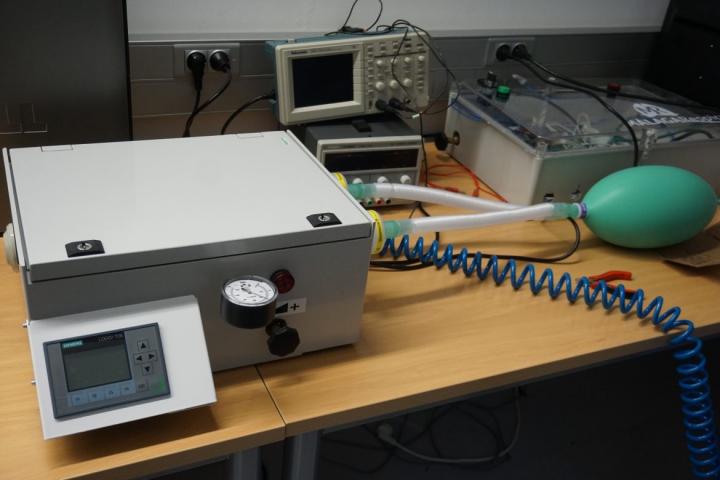The prototype, designed in a record time of 20 days, is authorized by the Spanish Agency of Medicines and Medical Devices, and has already gone into production

Credit: University of Malaga
The ventilator, developed by researchers from the Medical Robotics Research Group of the University of Málaga (UMA) in a record time of 20 days to strengthen health care response to COVID-19, is already being manufactured, after receiving authorization from the Spanish Agency of Medicines and Medical Devices (AEMPS) upon fulfilling all requirements for its approval.
‘Andalucía Respira’ offers a real alternative to the ventilators which are currently being used in intensive care units of hospitals, since it is based on common low-cost industrial parts (of air conditioning, irrigation or from the tyre industry) and contains no mobile components, which reduces the risk of mechanical failure. The prototype can be manufactured in approximately two hours.
Before obtaining the authorization of the AEMPS, this device had to pass multiple tests, the last two of a technical nature, under the supervision of a certification company. The first one tested the electromagnetism, which is especially important since it has direct bearing on the device safety, both for patients and for its interference in the rest of the medical equipment in an intensive care unit. The second test aimed at proving the device autonomy with an uninterruptible power supply (UPS) required to avoid breakdowns due to sudden power surges, which resulted in a duration of 48 hours.
In conjunction with these technical certifications, the ventilator developed by researchers of the UMA had to pass two clinical tests on humans. Both tests were carried out for four hours on patients affected by COVID-19 and admitted to the ICU, resulting in success indicators that validated this technology.
Previously, after an execution phase of the first prototype developed in two days, it was successfully tested on an artificial lung and an animal model.
Multidisciplinary team
The design of ‘Andalucía Respira’ involved a multidisciplinary team, made up of researchers of the UMA -in charge of taking the idea to engineering work applied to health- in collaboration with health professionals from the Regional and Virgen de la Victoria hospitals in Malaga and scientists from the Institute of Biomedical Research of Malaga (IBIMA).
Víctor Muñoz and Carlos Pérez del Pulgar, Professors of Engineering at the UMA, were responsible for the assembly and design of the circuit and the automation programming of this prototype, respectively; a work developed with the participation of Mª Victoria de la Torre, researcher of the UMA, and Ricardo González-Carrascosa, Veterinarian of this institution, who coordinated the test on an animal model in a previous phase, which also brought positive results after 24 hours in operation.
This multidisciplinary team also comprised Cardiovascular Surgeon Ignacio Díaz de Tuesta -main driver behind this project- and Intensive Care Physician and Clinical Coordinator Miguel Ángel Prieto, both from the Regional Hospital of Malaga, and José Luis Guerrero Orriach, Anesthesiologist and Intensive Care Physician from Virgen de la Victoria Hospital of Malaga. This medical team received advice from Gonzalo Varela Simó, Thoracic Surgeon and Scientific Adviser from the Hospital of Salamanca.
Likewise, scientists from the IBIMA took part in the development of this prototype, such as its Scientific Director Francisco J. Tinahones, the Head of the Innovation Unit of this research institute Isabel Guerrero, and its General Manager José Miguel Guzmán, as well as a large number of companies, such as Veolia, CATS and Dekra, among others, which in a gesture of solidarity have contributed material to the production of this prototype.
###
Media Contact
María Guerrero
[email protected]
Original Source
https:/




